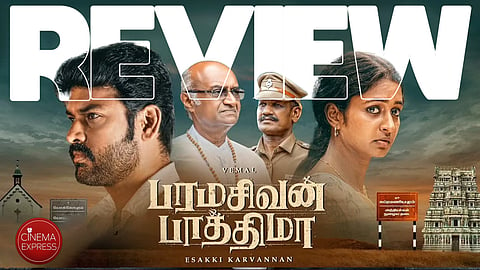Paramasivan Fathima Movie Review: This predictable film is ideologically inept and clumsily crafted
Paramasivan Fathima(1.5 / 5)
Generally, filmmakers find it easy to dish out social issues if their films are set in a fictional world. This helps you stay away from offending any powerful person, organisation or community. It also creates a space for uninhibited discussions. But filmmaker Esakki Karvannan is disingenuous with things he presents as issues and lacks honesty in exploring them fully.
Paramasivan Fathima introduces the fictional world of Subramaniyapuram and the towns split from it, namely Yokobpuram (predominantly Christian) and Sultanpettai (predominantly Muslim). The film begins with the narration that the rampant conversions are the reason for the split, and prospective grooms from both these towns die a day before their D-day. In parallel, we get glimpses of Paramasivan (Vemal) and Fathima/Tamilselvi (Chayadevi), teasing us with what could have happened to them even though the familiar stench of honour killing is discernible from a mile away. However, the film chooses to take a tiring 140 minutes to uninspiringly tell us the relation between the deaths and conversions.
Putting itself on a high pedestal, the film claims to impart some noble message, but is off the target right from the beginning. It reeks of contrivance, especially with no villager in this film having anything to do except be bothered by religion. It could be said that communal flare-ups in Tamil Nadu are few and far in between when compared to cases of caste discrimination. However, the absence of an engaging fictional story cannot be blamed on the social fabric of the state. The film should have ideally explored how bigotry comes in the way of religious harmony in the 21st century rather than creating a fictional world filled with people, who seem to be straight out of the Middle Ages.
The film also trivialises hunger and unemployment through Hindu characters coercing others in their community to not convert for "food and jobs" as though they aren't important enough for sustenance. The question is, what kind of pride should one take in a religion where one follower does not take care of another? Why will anyone not be grateful to someone from some other faith, who has taken it upon themselves to provide sustenance to live a dignified life? Also, it is important to note that the act of service done with an ulterior motive of converting more people to their religion cannot be brought under the umbrella term of 'service.' It is but a transactional relationship.
Can an apathetic person judge when someone from his 'brethren' converts to another religion after receiving certain favours from them? No. Some scenes and dialogues reflect the 'rice-bag convert' condescension in social media, but this anger would have been better justified if it was targeted at those depriving the starving people of their 'rice bag'. 20th-century American psychologist Abraham Maslow would have created a five-tier needs hierarchy that treats physiological and safety needs as having paramount importance for a bare minimum decent life. Food and material requirements aren't nothing. I am duty-bound to remind such self-righteous people that the miracle stories of Lord Krishna filling his impoverished friend Kuselan's house with riches just for a morsel of puffed rice and Lord Jesus multiplying five bread loaves and two fishes to feed 5000 people are being taught to their respective followers even to this day to praise God's glory, generosity and magnanimity.
CAST: Vemal, Chayadevi, MS Bhaskar, Sri Ranjani
DIRECTOR: Esakki Karvannan
This pernicious propaganda film takes a swipe at 'ricebag converts' while conveniently brushing under the carpet the caste inequalities and the terrible forms it takes, which is also a major reason for religious conversions. It is surprising that Esakki Karvannan, who last made Tamil Kudimagan, a film that denounces casteism, has followed up with this movie which is suspiciously silent on the caste question in the conversion context. But what it gets right is the opposition to the vilification of Hinduism as satanic to proselytise Christianity.
Unfortunately, the film has no redeeming factors, either in the performances or the screenplay front, even keeping aside the propaganda. It is a contest between bad cinematic language and the worst political message. When you thought it just couldn't get worse, the film flirts with multiple genres and finally ends as a horror film, to our bad luck. Everything about the film is forgettable. The film only speaks of the ill in Christianity while positioning itself as an anti-bigotry film. Paramasivan Fathima, in a nutshell, is an indignation of Hindus against Christians with no scope for introspection (for Hindus) and the makers feel it is justified when it's not.
An incident from the life of a 12th Century Tamil Hindu scholar and saint of the Vaishnavite school, Nanjeeyar, goes like this: Nanjeeyar was inquired by his disciple, 'What is Vaishnavism and who is a Vaishnavite?' to which he responds, 'someone who can feel the pain of others is a Vaishnavite (Read 'any religion of your choice') and someone who takes sadistic pleasure from it is a non-Vaishnavite.' This incident is said to have inspired the 15th Century Gujarati poet-saint Narsinh Mehta, who wrote the famous devotional song 'Vaishnav Jana To', which goes on to emphasise how crucial empathy is to spiritual enlightenment. This song had inspired greatly Mahatma Gandhi's views on religion. Sadly, filmmakers like Esakki need to be taught that a religion can only be sustained by humanistic qualities such as empathy and not by some arbitrary anti-conversion law.

